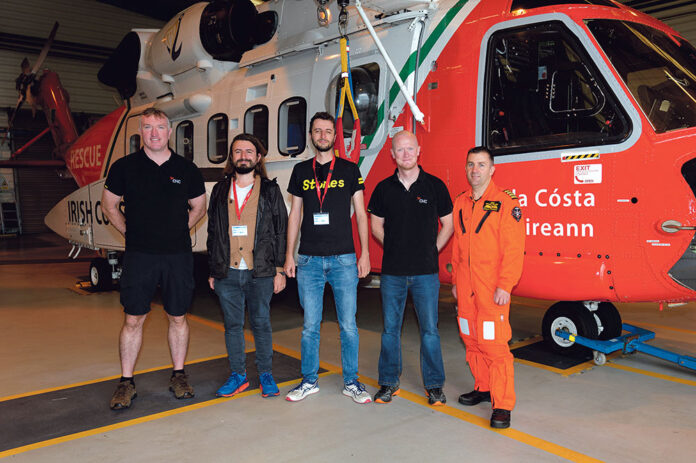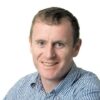TWO Italian brothers who were almost killed on Inis Mór two years ago before being saved by the crew of Shannon-based Coastguard Helicopter Rescue 115 helicopter were back in Ireland last week, thanking those who helped them.
Giovanni and Ricardo Zanon were in Ireland in 2019, to attend the Father Ted tribute event Tedfest, on Inis Mór.
Father Ted was of course a phenomenally popular 90s comedy, and the two brothers, who visited the Coast Guard base in Shannon last Thursday love the show, just as thousands of Irish people do.
“We are fans of Father Ted, strange as it may seem, we saw all the episodes multiple times. We decided to go there for Tedfest, I think it’s something they have every year,” says Giovanni.
While attending they went to see Poll na bPéist (the Wormhole) on the island. At the time they arrived Giovanni felt things were quite safe.
“It was February and the weather was cold, but there was no sign of major waves. Where we were standing, you wouldn’t think it was dangerous, also it was very dry.”
Unfortunately they were swept away by a large wave, taken from safety onto rocks where they were bleeding, seriously injured and at risk of death.
Ricardo had the most serious injuries, but Giovanni was also hurt, with cuts and bruises all over his body and a sprained ankle.
“I was the most shocked, because I think his (Ricardo’s) mind was concentrating on the pain. I could walk even though it hurt, but I knew better than him the danger we were in. I was more mentally shocked and he had more physical injuries. We were caught off guard,” Giovanni recalled.
They were very fortunate to be rescued, with CHC Winchman Philip Wrenn eventually managing to scramble them to safety.
Initially it hadn’t seemed likely to Giovanni that anyone would come for them.
“We started to shout, just into the air really, because when you’re down there you don’t see anybody. There hadn’t been a soul around, but there was someone at a certain point, who called the Gardai, who got the rescue team.
After half an hour we heard a helicopter and then we saw it. I remember waving, to make it clear we were there, and then we were rescued.
“The rescue itself was difficult, it was very hard. They had to sort of improvise. To me it was like Jesus, someone was coming down to save us.
“We were really screwed, it was the first time in my life I thought I would die. But luckily it wasn’t that way. The weather had been bad, there was no one around and we could have died because of the waves or because of losing blood.”
He is hugely appreciative of the work that went into saving himself and his brother.
“Grateful is not the word. We would not be here if it were not for Phil and the other guys.
“We have a special force like that in my home town, I’m a journalist myself and I deal with the rescue guys and I think they never get the credit they deserve.”
In difficult conditions it was particularly hard to get them onto the helicopter, and just after they were taken away another wave struck, which could well have seen them off.
Giovanni is also a musician and has made a record called Wormhole, marking the incident.
He felt it was important to come back to the west of Ireland again.
“We wanted to go to the place with Philip, we wanted to thank the CHC crew personally. Generally, we wanted to be in love with Ireland once again.”
He also felt that going back to the scene of the accident had been very positive for him.
“It was something really special. It was the same place, but totally different emotions. We were scared and lost the first time, but very relaxed and thankful this time.”
Ricardo shattered a leg and broke various other bones in the incident, while he has only recently been able to walk without a cane once again.
“I’m almost done with the recovery. It took me almost two years, especially my left leg.
“The pelvis was fixed quickly, I was in Tallaght and two rods were put in that will stay with me forever.
“Then the leg, the bone was so shattered, they had to work with the pieces that were left and then reconstruct eight centimeters to get the two legs the same length.”
He said that Poll na bPéist does make for spectacular viewing, but that more advice should be available about the dangers, which may not be apparent especially to people who haven’t experience of the Atlantic.
While Ricardo’s physical injuries were undoubtedly very severe, he says he hasn’t been haunted by it and was mentally fine afterwards.
However, he was glad to be able to visit with his parents and fiancee to explain to them what had happened.
“I haven’t been shocked or haunted by this, I’m fine about it. I have a lot of physical injuries to think of.
“But I wanted to do it for them, so they could see where it happened and talk about it.”
‘Your training kicks in, you just react’
THE resuce of Giovanni and Ricardo Zanon was heroic, and it’s the kind of thing the crew of Rescue 115 are prepared to do every time they come to work.
Colm O’Grady was CHC captain on the day, and they were already in the air when the call came through.
“We were airborne so it was a very quick response and we were overhead quite quickly. We’re very familiar with the air from training out there.
“The guys were very quick to deploy Philip, he jumped into action and we held back for noise abatement. We let Philip prepare Giovanni for packaging to get him up into the aircraft.
“The co-pilot then, Aaron Hyland, saw a big wave coming in, he tried to alert Philip, but it just hit them. From there we went into the overhead again and Kieran McHugh, the winch-op, immediately lifted all three. Philip had strapped himself and the two boys and they came up in the hoist. I’d say we were in Galway hospital in ten minutes.”
They frequently go from being relatively relaxed to being in a life or death situation.
“You can have days like that where you’re just training and it can flip from a reasonably relaxed environment to an intense situation where somebody’s life is at risk.
“In that one, with the amount of bleeding, the severity of the break and the fact there were big waves coming through, the fact that we got them out of there and into hospital was fantastic. “People sometimes forget Galway hospital and the job they do, they’re so good in there, and the lads were in theatre within minutes of us getting there.”
The Sikorsky helicopter they use can cruise at around 170mph, and on the day with waves crashing close to the two brothers, the speed may have made the difference.
Philip Wrenn, Search and Rescue Winchman, has won a Billy Deacon award for his role in the rescue, in which he displayed ability and bravery in a situation in which his own life was at risk.
Recalling the day, he says, “We had been tasked to go to the Cliffs of Moher for a search and while en route we were tasked further, to what we were told was one person.
“When we got on scene there weren’t many people there, but we realised there were two people at the base of the cliff. Conditions were fairly rough and we decided to deploy directly to the casualties.”
The weather made things exceptionally difficult on that morning.
“With the conditions that were there we weren’t going to hang around. When I got down I did a quick assessment of the two guys, I knew one had mobility, he could move.
“Both of them were destroyed, they had cuts and bruises and abrasions all over, their clothes were all ripped to bits.
“When I checked out Ricardo I realised he had a fairly bad fractured leg, his pelvis was also painful as well. We use a basket stretcher with a spinal immobilisation kit and I asked for double strops.
“The reason I asked for double strops was with the conditions, if all came to all we could take them away on the two strops.
“I had Giovanni set up to winch on the strop and Ricardo was being prepared for the spinal kit, because he was the most serious.
“In the process of immobilisng Ricardo I had my back to the sea, and that’s when the wave hit us. It knocked Ricardo and myself forward, I landed on top of Ricardo, we were both submerged in the water and I had to hold him under the water to prevent him being washed away. All my kit, my helmet, all the medical equipment, they were all washed away, the stretcher was gone.”
His colleagues actually thought that Philip himself was now in bother.
“With my helmet gone, the lads in the helicopter thought that I was washed away. After that the water tried to suck us back out again, so I was holding onto Ricardo in the water.
I got on the radio, told the lads we’d been washed by waves and looked for a single lift. I went to work to get Ricardo out of the immobilisation kit and I put him in the other strop.
“By the time I had done that the lads had circled around and were directly overhead. By the time the three of us were connected up safely, the hook appreared and we got winched out. As we were getting winched up, another wave had splashed up around us.”
Had they not been ready by the time of that third wave, there could have been a less fortunate outcome. His damaged helmet actually washed up a few days later.
Philip says his training had him well prepared for what was a very extreme situation.
“We train every day really and we try to train for most scenarios. You can’t have the training and know what you’ll do in every scenario, but we train as much as we can for as many scenarios. “Your training just kicks in, you just react, make decisions on the go. If you sat there thinking about it you’d be hit by another wave.”
Owen Ryan has been a journalist with the Clare Champion since 2007, having previously worked with a number of other publications in Limerick, Cork and Galway. His first book will be published in December 2024.


